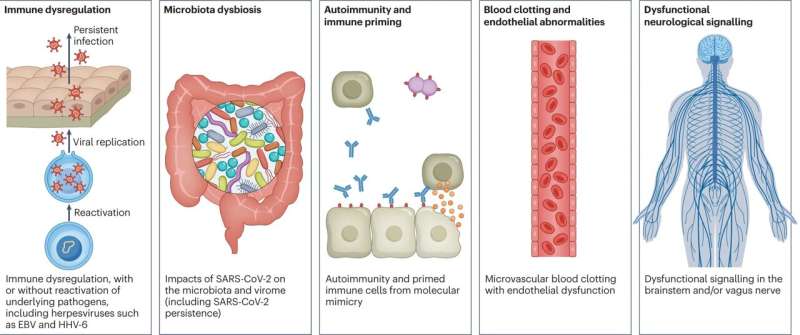Research review suggests long COVID may last indefinitely for some people and mimic other ailments


A small team of researchers, two from the Patient-Led Research Collaborative, the other two from the Scripps Research Translational Institute, has published a Review article in the journal Nature Reviews Microbiology suggesting that long COVID might be a bigger threat than has been realized.
Prior research has shown that some people infected with the SARS-CoV-2 virus develop symptoms beyond the respiratory system. Patients have reported feeling deep fatigue, irregular heartbeat, numbness in extremities and even trouble with organs such as their liver or bladder. Over time, these patients have been diagnosed with long COVID, a mysterious condition without an official diagnostic description.
And while a lot of research has been conducted regarding the respiratory system, including treatments and therapies, and in creating vaccines, little has been done to solve the mystery of long COVID or to treat those who claim to have it. In this new effort, the researchers took a hard look at research by a variety of groups.
The authors on this new effort found evidence in prior reports suggesting that approximately 10% of people infected with COVID-19 develop long COVID and that it is most prevalent in people between the ages of 36 and 50. They also found that people who have mild cases of long COVID will likely recover from it within a year. Unfortunately, for those with more severe symptoms, the outlook is grim. They found few signs that symptoms will ever lessen.
They also found that in many cases, the symptoms of long COVID become nearly indistinguishable from several other conditions, such as chronic fatigue syndrome, mast cell activation syndrome and postural orthostatic tachycardia syndrome. Notably, they point, out, many such symptoms are consistent with autonomic dysfunction.
As one example of the difficulties facing both patients and doctors, the authors found many instances of patients suffering from long COVID who had symptoms identical to postural orthostatic tachycardia syndrome. The findings suggest that these patients will live with their symptoms for the rest of their lives. They conclude by noting that women appear to be more at risk of developing persistent long COVID and face more skepticism from physicians.
More information:
Hannah E. Davis et al, Long COVID: major findings, mechanisms and recommendations, Nature Reviews Microbiology (2023). DOI: 10.1038/s41579-022-00846-2
Journal information:
Nature Reviews Microbiology
Source: Read Full Article